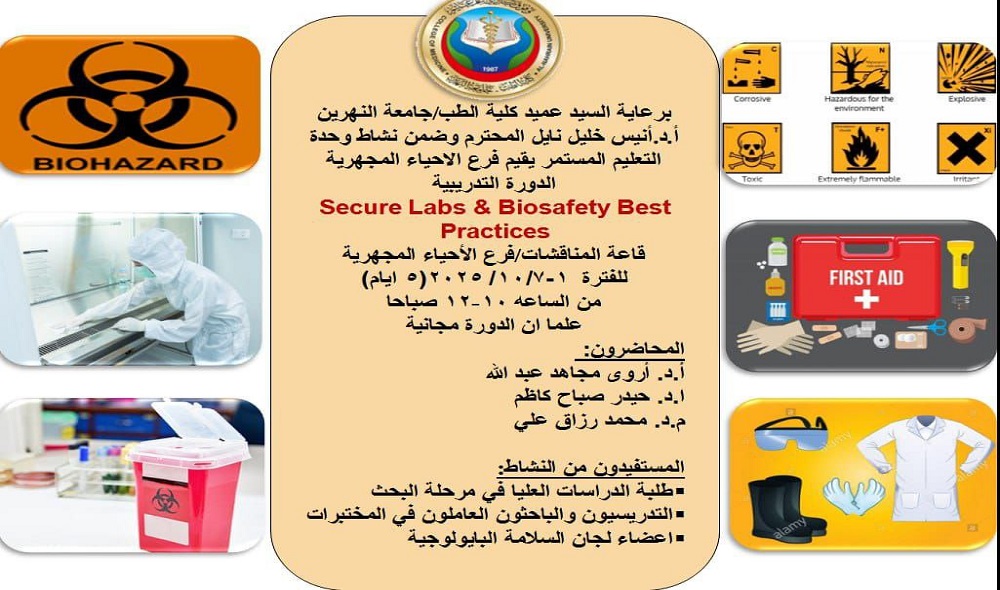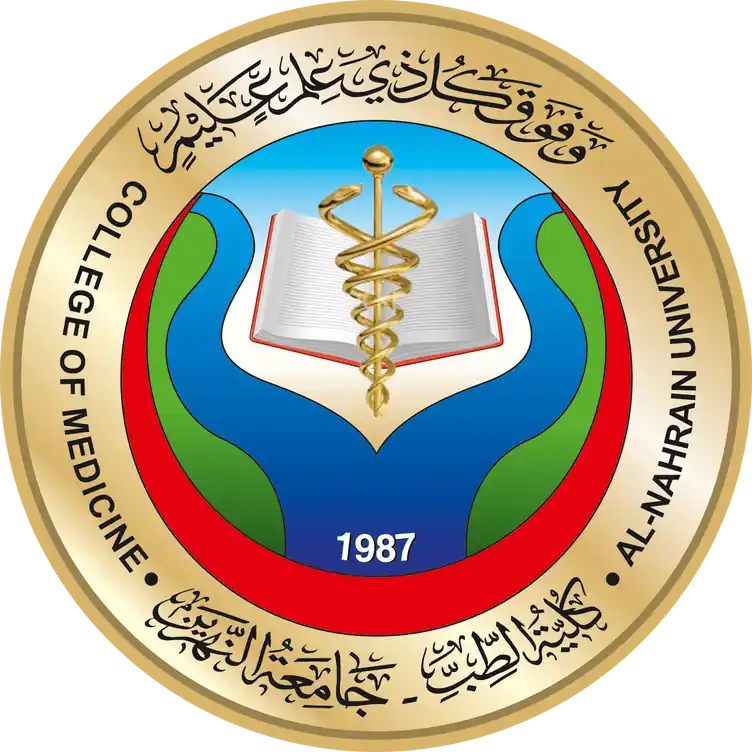زيارة ميدانية لطلبة طب النهرين إلى مؤسسة العين للرعاية الاجتماعية
برعاية السيد عميد كلية الطب جامعة النهرين الأستاذ الدكتور ( أنيس خليل نايل ) نظمت وحدة الإرشاد النفسي الجامعي في الكلية زيارة ميدانية لعدد من طلبة الك...
تتشرف كلية الطب – جامعة النهرين بالإعلان عن إقامة المؤتمر العلمي الدولي الثالث عشر لجامعة النهرين تحت عنوان الشراكة الأكاديمية، التميز البحثي، والتعاون العالمي في الطب يهدف المؤتمر إلى جمع الباحثين والأكاديميين والأطباء والتربويين من داخل العراق وخارجه، لتعزيز البحث العلمي، ودعم الشراكات الأكاديمية، وتبادل الخبرات العلمية في مختلف المجالات الطبية
جامعة النهرين .. بين الواقع والمستقبل تسعى جامعة النهرين الى تأمين قاعدة بيانات من الخبرات العلمية تتوافر فيها قابليات الابداع وتطبيق الجودة والسعي للحصول على الاعتمادية الدولية, كما تسعى
تسعى لجان الاعتمادية البرامجية في الكلية للحصول على الاعتماد الدولي من خلال تبني برنامج تعليمي مواكب للشروط والمواصفات المحددة من قبل الفدرالية العالمية للتعليم الطبي (WFME) ومواصلة عملية التطويرمن خلال التقييم الذاتي المستمر، وقد حصلت كلية طب النهرين في نيسان 2024 على الاعتماد الدولي من خلال حصولها على اعتماد هيئة مؤسسات التعليم العالي ونظام الجودة الاردنية (AQACHEI) المعتمدة من قبل (WFME). وكانت الكلية قد حصلت عام 2022 على إعتماد مشروط من قبل المجلس الوطني لاعتماد كليات الطب في العراق (NCAMC) وتعمل على الحصول على الاعتماد الكامل من نفس المجلس ومن خلال عمل ثلاث لجان للاعتمادية وهي:
وخلال سنوات عمل لجان الاعتمادية في الكلية منذ عام 2007 تمت كتابة اربعة طبعات من التقرير الذاتي للكلية للاعوام
2010 - 2014 - 2018 (وتعديله عام 2021) - 2023
برعاية السيد عميد كلية الطب جامعة النهرين الأستاذ الدكتور ( أنيس خليل نايل ) نظمت وحدة الإرشاد النفسي الجامعي في الكلية زيارة ميدانية لعدد من طلبة الك...
نجح فريق جراحي مكون من الاستاذ الدكتور بشار عباس رئيس فرع الجراحة في كلية الطب جامعة النهرين اختصاص دقيق جراحة الجهاز الهضمي والكبد، والدكتور علي راضي...
جرت مناقشة رسالة طالبة الماجستير (زينب حازم عبد الحسين) في فرع علم وظائف الاعضاء /الفسلجة في كلية الطب جامعة النهرين والموسومة:(Diagnostic Utility o...
برعاية السيد عميد كلية الطب في جامعة النهرين الاستاذ الدكتور انيس خليل نايل وانسجاما مع الاهداف النبيلة والانسانية لشهر رمضان المبارك نظمت وحدة شؤون ا...
عقد اجتماع مجلس الادارة بحضور الاستاذ الدكتور ( انيس خليل نايل ) عميد كلية الطب جامعة النهرين والدكتور (وائل كامل حمد ) مدير عام دائرة صحة بغداد الكرخ...
توجت كلية الطب جامعة النهرين بالفوز بالمركز الاول في مسابقة التصوير الفوتوغرافي الجامعية التي نظمتها جامعة النهرين ضمن المنهاج السنوي لوزارة التعليم ا...
برعاية السيد عميد كلية الطب جامعة النهرين الأستاذ الدكتور ( أنيس خليل نايل ) نظمت وحدة الإرشاد النفسي الجامعي في الكلية زيارة ميدانية لعدد من طلبة الك...
نجح فريق جراحي مكون من الاستاذ الدكتور بشار عباس رئيس فرع الجراحة في كلية الطب جامعة النهرين اختصاص دقيق جراحة الجهاز الهضمي والكبد، والدكتور علي راضي...
جرت مناقشة رسالة طالبة الماجستير (زينب حازم عبد الحسين) في فرع علم وظائف الاعضاء /الفسلجة في كلية الطب جامعة النهرين والموسومة:(Diagnostic Utility o...

المؤتمر العلمي الدولي الثالث عشر لكلية الطب - جامعة النهرين

المختبرات الآمنة وأفضل ممارسات السلامة البيولوجيةالمحاضرون:الفئة المستهدفة:طلبة الدراسات العليا في مرحلة البحثالتدريسيون والموظفون العاملون في المختبر...

تتويجاً للجهود العلمية والبحثية المبذولة من قبل الأستاذ المساعد الدكتور ( قحطان عدنان مهدي ) عضو الكادر التدريسي في فرع الجراحة اختصاص (طب وجراحة عا...

تتويجاً للجهود العلمية والبحثية المبذولة من قبل المدرس الدكتورة نسرين احمد ناصر / التدريسية في فرع الكيمياء والكيمياء الحياتية اختصاص ( علوم كيميا...

تتويجاً للجهود العلمية والبحثية المبذولة من قبل الأستاذ المساعد الدكتورة اقبال غالب فرهود التدريسية في فرع الطب الباطني اختصاص (طب وجراحة عامة - الأمر...
. برعاية السيد رئيس جامعة النهرين الأستاذ الدكتور علي عبدالعزيز الشاوي،والسيد عميد كلية الطب – جامعة النهرين الأستاذ الدكتور أنيس خليل نايل، تُقيم الو...











